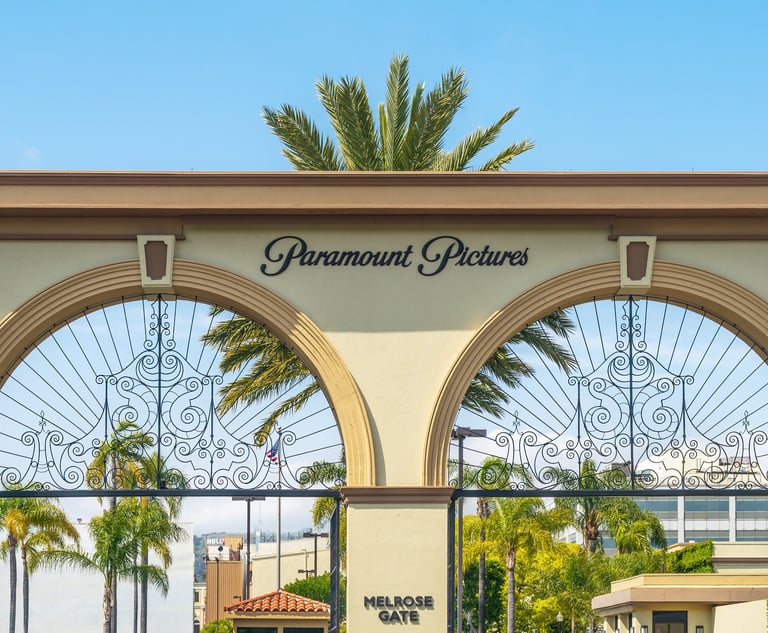Dallas-Based Investors Emerge as Weinstein Co. Buyers
Lantern Capital Partners is on the verge of acquiring The Weinstein Co. in a bankruptcy sale, after it was revealed that no bidders had topped the private equity firm's $310 million offer to buy the embattled studio's film library and television business.
May 02, 2018 at 03:11 PM
5 minute read
 Harvey Weinstein at the Weinstein and Netflix Golden Globes after-party at Beverly Hilton Hotel adjacent on Jan. 8, 2017 in Beverly Hills, California. Photo Credit: Photo: Kathy Hutchins/Shutterstock.com
Harvey Weinstein at the Weinstein and Netflix Golden Globes after-party at Beverly Hilton Hotel adjacent on Jan. 8, 2017 in Beverly Hills, California. Photo Credit: Photo: Kathy Hutchins/Shutterstock.com
Lantern Capital Partners is on the verge of acquiring The Weinstein Co. in a bankruptcy sale, after it was revealed that no bidders had topped the private equity firm's $310 million offer to buy the embattled studio's film library and television business.
The Weinstein Co.'s Richards, Layton & Finger and Cravath, Swaine & Moore attorneys told a Delaware bankruptcy judge late Tuesday that they would not proceed with a planned auction of the entertainment company, which was co-founded by disgraced Hollywood producer Harvey Weinstein.
The development was the latest blow to women who had hoped to recover against the company for abuses suffered at the hands of company co-founder Harvey Weinstein, who has been accused of sexual misconduct by dozens of women.
While the studio had received multiple offers by Monday's bidding deadline, none had topped Lantern's stalking-horse offer, counsel said in a three-page filing signed by Richards Layton associate Joseph C. Barsalona II.
“In accordance with the bidding procedures and the bidding procedures order, the debtors, after consulting with the consultation parties, have designated the stalking horse bidder as the successful bidder and the stalking horse bid as the successful bid,” the notice read.
The Weinstein Co. is represented by Mark D. Collins, Paul N. Heath, Zachary I. Shapiro and Brett M. Haywood, also from Richards Layton. The Cravath team includes Paul H. Zumbro, George E. Zobitz and Karin A. DeMasi in New York.
The Weinstein Co. had entered bankruptcy in March with a stalking-horse agreement to sell the studio to Dallas-based Lantern for $310 million in cash, plus the assumption of some debt. Bidding, however, was open to third parties who could match Lantern's offer and increase its value by $1 million or more, in addition to meeting other requirements.
U.S. Bankruptcy Judge Mary F. Walrath of the District of Delaware last month adopted a plan from The Weinstein Co.'s bankruptcy counsel, which set an end date for bidding and scheduled a May 4 auction among qualified bidders to be held at Richards Layton's Wilmington offices, if the company were to receive a better offer.
Walrath is required to sign off on any sale, and the deal may still be challenged by the studio's creditors. A sale hearing is slated for May 8 in Wilmington.
Lantern's press shop did not respond Wednesday to multiple requests for comment.
The Weinstein Co. filed for Chapter 11 bankruptcy March 19, amid a national backlash over allegations that Harvey Weinstein had sexually abused and assaulted women in the entertainment industry for years. In court filings, the studio said it had lost 25 percent of its workforce and millions of dollars in production and distribution agreements since the scandal surfaced in October.
Harvey Weinstein has denied allegations of nonconsensual sex. He was fired from the company last October and was expelled from the Academy of Motion Picture Arts and Sciences in the wake of the scandal.
At least nine women have accused The Weinstein Co. in lawsuits of enabling Weinstein's alleged pattern of predatory behavior. Those lawsuits have been halted during the bankruptcy proceedings, but if the sale is approved, Lantern would be free of any legal liability currently pending against the company.
Weinstein's accusers had formed a committee of unsecured creditors to pursue their interests in bankruptcy. However, the group is expected to see little to no distribution in the proceedings, given the size of The Weinstein Co.'s $345 million secured debt owed to banks and other financial institutions that had lent the studio money, experts have said.
New York Attorney General Eric Schneiderman had tried unsuccessfully to broker a deal to sell the company for $500 million to a group of interested buyers. According to media reports, the discussions included a pledge of $90 million to settle victims' claims, but negotiations fell apart in March over questions of undisclosed debts.
Schneiderman, who was not involved in the bidding process or the development of Lantern's offer, has sued The Weinstein Co. under a broad provision of New York law that authorizes the state to file suit against a company for “fraudulent or illegal acts” perpetrated against its citizens.
Schneiderman earlier this week sent an open letter to potential buyers, reiterating his position to set aside financial resources to “compensate and provide support services for injured employees and industry talent.”
On Monday, a spokeswoman for the New York Attorney General's Office said Schneiderman's lawsuit and investigations would remain open and ongoing.
“From the start, we've underscored the importance of adequately compensating victims, protecting current and future employees, and ensuring that wrongdoers are not rewarded,” Schneiderman's press secretary, Amy Spitalnick, said in an emailed statement.
Meanwhile, Weinstein's accusers are expected to pursue their claims against Harvey Weinstein individually. Earlier this week, Ashley Judd accused the movie mogul in a lawsuit of damaging her career after the actress rebuffed his sexual advances in a hotel room.
So far, more than 80 women have come forward to accuse Weinstein of sexual misconduct.
This content has been archived. It is available through our partners, LexisNexis® and Bloomberg Law.
To view this content, please continue to their sites.
Not a Lexis Subscriber?
Subscribe Now
Not a Bloomberg Law Subscriber?
Subscribe Now
NOT FOR REPRINT
© 2025 ALM Global, LLC, All Rights Reserved. Request academic re-use from www.copyright.com. All other uses, submit a request to [email protected]. For more information visit Asset & Logo Licensing.
You Might Like
View All

Del. Supreme Court Unanimously Grants Another Shareholder Win Over Pre-Vote Disclosure
4 minute read
Trump, Truth Social Attorneys Expect 'Solid' Chance at Shareholder Case Dismissal
3 minute readTrending Stories
- 1Can a Law Firm Institutionalize Its Culture? Boies Schiller’s New Chairman Will Try
- 2Full 8th Circuit Hears First Amendment Challenge to School District’s ‘Equity Training’
- 3Exploring Generative AI’s Impact on Intellectual Property
- 4Training Lawyers in AI and Using AI to Boost Training
- 5EB-5 Rebounds After a Rocky Year: Challenges of 2024 Lay Groundwork for a Booming 2025
Who Got The Work
J. Brugh Lower of Gibbons has entered an appearance for industrial equipment supplier Devco Corporation in a pending trademark infringement lawsuit. The suit, accusing the defendant of selling knock-off Graco products, was filed Dec. 18 in New Jersey District Court by Rivkin Radler on behalf of Graco Inc. and Graco Minnesota. The case, assigned to U.S. District Judge Zahid N. Quraishi, is 3:24-cv-11294, Graco Inc. et al v. Devco Corporation.
Who Got The Work
Rebecca Maller-Stein and Kent A. Yalowitz of Arnold & Porter Kaye Scholer have entered their appearances for Hanaco Venture Capital and its executives, Lior Prosor and David Frankel, in a pending securities lawsuit. The action, filed on Dec. 24 in New York Southern District Court by Zell, Aron & Co. on behalf of Goldeneye Advisors, accuses the defendants of negligently and fraudulently managing the plaintiff's $1 million investment. The case, assigned to U.S. District Judge Vernon S. Broderick, is 1:24-cv-09918, Goldeneye Advisors, LLC v. Hanaco Venture Capital, Ltd. et al.
Who Got The Work
Attorneys from A&O Shearman has stepped in as defense counsel for Toronto-Dominion Bank and other defendants in a pending securities class action. The suit, filed Dec. 11 in New York Southern District Court by Bleichmar Fonti & Auld, accuses the defendants of concealing the bank's 'pervasive' deficiencies in regards to its compliance with the Bank Secrecy Act and the quality of its anti-money laundering controls. The case, assigned to U.S. District Judge Arun Subramanian, is 1:24-cv-09445, Gonzalez v. The Toronto-Dominion Bank et al.
Who Got The Work
Crown Castle International, a Pennsylvania company providing shared communications infrastructure, has turned to Luke D. Wolf of Gordon Rees Scully Mansukhani to fend off a pending breach-of-contract lawsuit. The court action, filed Nov. 25 in Michigan Eastern District Court by Hooper Hathaway PC on behalf of The Town Residences LLC, accuses Crown Castle of failing to transfer approximately $30,000 in utility payments from T-Mobile in breach of a roof-top lease and assignment agreement. The case, assigned to U.S. District Judge Susan K. Declercq, is 2:24-cv-13131, The Town Residences LLC v. T-Mobile US, Inc. et al.
Who Got The Work
Wilfred P. Coronato and Daniel M. Schwartz of McCarter & English have stepped in as defense counsel to Electrolux Home Products Inc. in a pending product liability lawsuit. The court action, filed Nov. 26 in New York Eastern District Court by Poulos Lopiccolo PC and Nagel Rice LLP on behalf of David Stern, alleges that the defendant's refrigerators’ drawers and shelving repeatedly break and fall apart within months after purchase. The case, assigned to U.S. District Judge Joan M. Azrack, is 2:24-cv-08204, Stern v. Electrolux Home Products, Inc.
Featured Firms
Law Offices of Gary Martin Hays & Associates, P.C.
(470) 294-1674
Law Offices of Mark E. Salomone
(857) 444-6468
Smith & Hassler
(713) 739-1250







